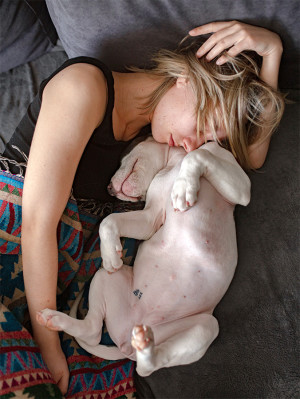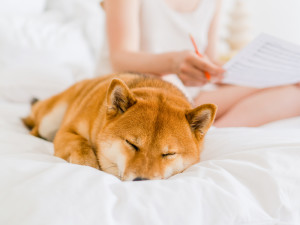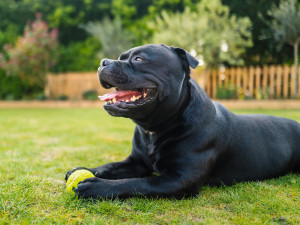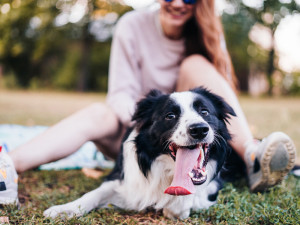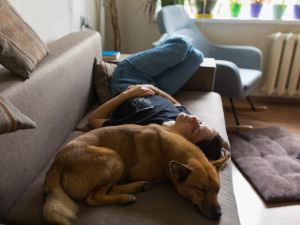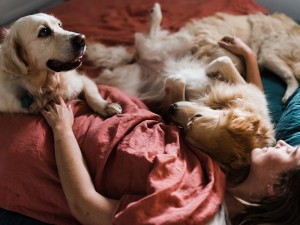
Share Article
In This Article:
Is It Normal for Puppies to Breathe Fast While Sleeping? Do Puppies Have REM Sleep? Reasons Why Your Puppy Breathes Fast While Sleeping Frequently Asked Questions
Is there anything cuter than watching your puppy sleep? There is something so satisfying about seeing your puppy at peace and all tuckered out from a full day of play and snuggles. And yet, the more you obsessively stare at your adorable sleeping puppy, the more you may notice things that have you asking, is that normal?
Until you have a puppy of your own, you may not have spent much time observing the sleep habits of puppies or any dogs for that matter. It may come as a surprise to see all the different puppy sleep phases. The good news is that most puppies have predictable sleep patterns and changes in their breathing are typically a normal part of their sleep cycle.
Depending on the age of your puppy, their breathing rate may also be faster than adult dogs even when they are awake, so keep that in mind if you are comparing your puppy to an older dog. Read on to learn more about normal breathing patterns in puppies.

Is it normal for puppies to breathe fast while sleeping?
Yes, the good news is that most of the time, it is perfectly normal for a puppy to breathe fast while sleeping. This is because their respiratory rate — or the number of breaths they take per minute — changes during different phases of sleep, and some stages of sleep are more active than others.
You should notice that your puppy’s breathing shifts during a long nap or overnight sleep from rapid breathing into slower breathing at different times, but if you are also sleeping, you may not catch all of these phases. Another reason your puppy may appear to be breathing fast while sleeping, especially if you are comparing your puppy’s breathing to an adult dog, is that younger puppies generally have a faster respiratory rate than dogs over six months old.
Do puppies have REM sleep?
Yes, puppies and dogs of all ages have REM sleep just like humans. REM sleep stands for rapid eye movement sleep, and defines an active phase of sleep where the eyes move back and forth rapidly within the eyelids. This phase of sleep is also characterized by more active brain activity which may lead to dreaming or twitching.
REM sleep tends to occur later in the sleep cycle and is preceded by non-REM sleep, which includes drowsiness, and slow wave sleep, also known as the deep-sleep phase. These different phases of the sleep cycle last from just a few minutes up to a few hours so in a typical night’s sleep, puppies cycle through all of these different phases multiple times. Young puppies, just like human babies, spend more of their sleep cycle in REM sleep. As they get older, REM cycles tend to become shorter. It is during their REM sleep that you are more likely to notice shallow or rapid breathing. This also explains why younger puppies tend to have more episodes of rapid breathing during their sleep cycle than older dogs, because they are spending more time in the REM phase.
Reasons why your puppy breathes fast
The most likely explanations for a puppy breathing rapidly while sleeping are that either this is their normal respiratory rate, and it is just faster than an adult dog’s, or that they are in a more active phase of the sleep cycle.
There are certainly other reasons for a puppy to be breathing rapidly, and it is important to seek veterinary attention right away if you believe your puppy’s breathing is abnormal. A dog that is having a breathing problem will show signs when they are awake as well as when they are asleep; monitor your dog when they are awake, too, and see if you notice anything that seems off.
To gauge whether your puppy’s breathing is normal, you can count their resting respiratory rate. This means counting your puppy’s breaths per minute when they are awake but resting quietly. This should be a nice, slow, rhythmic pattern. If their breathing is shallow, rapid, or labored even when they are just resting quietly, that is an indication of a problem. Be sure to do this when they are truly at rest and not right after play, exercise, or other causes of excitement. Some explanations for rapid breathing include:
Dreaming
Dreaming is part of the REM cycle of sleep when dogs may have an increased rate of breathing along with more shallow breaths, twitching, or vocalizing. This is perfectly normal, adorable, and should stop once they enter the phase of deep sleep, or if they are awakened.
Overheated
Dogs pant to cool off and this requires a rapid passage of air through the respiratory system. If the ambient temperatures are very warm, your dog will continue to breathe quickly even at rest or when asleep to try to stay cool.
Exercised recently
Exercise, play, and other excitement will increase both their heart rate and respiratory rate. It also may result in a temporary increase in body temperature, requiring them to pant to cool off. All of this can result in rapid breathing. Their breathing should return to a slower rate once they have had adequate time to settle down. Usually if they are calm enough to fall asleep, their breathing will also have returned to a slower rate.
Anxiety, excitement, or fear
Situations that cause excitement, anxiety, or fear can also increase a dog’s heart rate and breathing rate and may also result in panting. This is part of their flight or fight response. Once again, if they have calmed down enough to rest and fall asleep, their breathing rate should also return to a slower pattern.
Pain
Pain can stimulate the body to have an increased heart rate and breathing rate. Dogs who are in pain may also hide, avoid affection, growl protectively, have a decreased appetite, or other signs of their injury, like a limp.
Heart or lung problems
Sometimes, an underlying heart or lung problem can affect a dog’s breathing and may result in rapid breathing, labored breathing, or even a cough. Some congenital conditions that puppies can be born with are heart malformations, diaphragmatic hernias, or cleft palates, all of which may result in breathing abnormalities. They can also be susceptible to certain infectious diseases like kennel cough, which more recently has become known as canine infectious respiratory disease complex (CIRDC), which can cause cold-like symptoms, coughs, or even pneumonia.
Anemia
Anemia is a lack of red blood cells in circulation. This can be due to bleeding, such as after a traumatic injury or ingesting toxins like rodenticide. Anemia may also be the result of certain infectious diseases like tick-borne diseases or fleas. Finally, anemia can be caused by a lack of production of red blood cells due to a problem with the bone marrow.
Regardless of the underlying cause, anemic dogs will have pale gums, be very weak, and often have rapid breathing as they try to compensate for the lack of red blood cells delivering oxygen to their body. This is a medical emergency and should be treated by a veterinarian right away.
Brachycephalic syndrome
Breeds that are known for their smushed face look including French Bulldogs, American Bulldogs, Pugs, Pekingese, and Shih Tzus have anatomical changes in their bone structure as well as in their airways, which are collectively known as brachycephalic syndrome. These dogs may have difficulty breathing even at rest, are more likely to snore, and are vulnerable to respiratory distress and overheating after exercise and in hot weather. Any sudden changes in their breathing should be evaluated by a vet right away as they can get worse quickly without medical attention.
FAQs (People also ask):
Why does my puppy twitch in their sleep?
Twitching during sleep is almost always associated with the REM sleep phase. As long as the twitching stops when they are awake or in other phases of sleep, it is nothing to worry about.
Why is my dog breathing heavily?
Heavy breathing can have many causes. Some are considered normal within a reasonable range, such as during exercise, or periods of excitement or fear. Other times, this can be a sign of a serious underlying problem. Checking your dog’s resting respiratory rate can be a helpful way to distinguish these causes. An adult dog who is calm, quiet, and resting should have a steady, consistent respiratory rate of less than 30 breaths per minute. If you know what your dog’s typical resting rates are, and they are suddenly trending much higher, you’ll know you need to seek medical care for your pup.
References:

Dr. Amy Fox, DVM
Amy Fox, DVM is a small animal veterinarian in New York City with over thirteen years of experience in a mixture of general practice, emergency medicine, and shelter medicine. A lifelong animal lover, Dr. Fox studied biology in college and then worked as a veterinary nurse before pursuing veterinary school at Cornell University. Her expertise includes surgery, dentistry, and management of chronic conditions, and she is interested in toxicology, pain management, nutrition, care of senior pets, and educational outreach. Dr. Fox also enjoys writing about veterinary medicine and teaching, and her work has previously appeared in Spruce Pets. In her free time, she loves to cook, garden, go for long runs, and hang out with her goofy mixed-breed dog May, who provides never ending comic relief!
Related articles
Why Is My Dog Panting?
Why Does My Dog Snore?
It seriously sounds like another human being is in the room.
Can Dogs Get Congested?
How to look out for the signs your pup is feeling stuffed up.
Why Does My Dog Sleep on Their Back?
It is so sweet...
![Woman wearing a black t-shirt and jeans laying on the couch with her dog taking a nap]()
What Are the Effects of Sleeping With Your Dog in Bed?
There are pros and cons of sleeping with your dog—for both of you.
![Woman lying in bed with two golden retrievers]()
13 Reasons You Should Let Your Dog Sleep in Your Bed
It’s science (and adorable).

